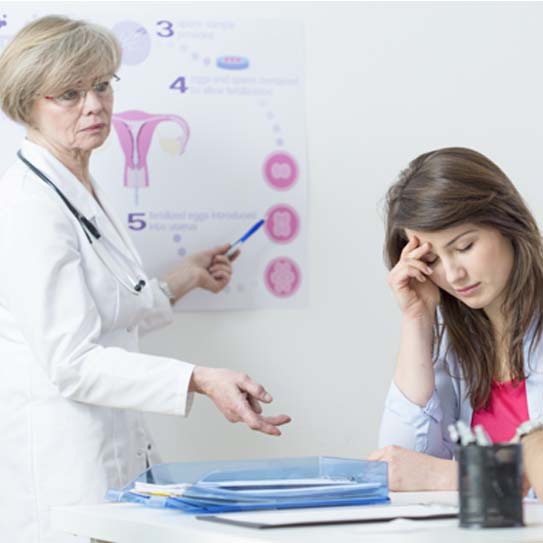Treatment of female infertility
The treatment of female infertility depends on the cause of the problem. With advancements in the medical field in recent times, couples today can resort to any of the following methods to conceive a baby.
The treatment for female infertility can also involve medication, surgery, non-surgery, and reproductive assistance such as ART.
If the cause of infertility can be treated by medicines, the doctor is likely to recommend the same.
Fertility medications
Fertility medications are often the first line of treatment for couples who have been trying to conceive for a long time but are facing difficulty. For the infertility specialist to determine the best medicines in your case, an accurate and thorough diagnosis is extremely important. The most commonly used fertility drugs are gonadotropins and Clomid. These medicines are used to induce ovulation. Gonadotropins are used to enhance ovarian stimulation in patients. Gonadotropins can be used as part of both IVF and IUI. Different types of gonadotropins for infertility treatments include:
FSH (follicle-stimulating hormone)
Mixture of FSH and LH (luteinizing hormone) – also called hMG or human menopausal gonadotropin
hCG (human chorionic gonadotropin)
Surgery
Surgery is often recommended to correct abnormally shaped uterus, remove fibroids from the uterus, and unblock fallopian tubes.
Non-surgical
Egg Freezing
Egg freezing, also known as ‘oocyte cryopreservation, is the best technology for any woman who does not plan to get pregnant immediately but wants to have a baby someday. In this method, the eggs from the ovaries are harvested and are frozen, and stored to be used later. Egg freezing is often combined with in-vitro fertilization and the fertilized egg is then implanted in the uterus of the woman. Infertility specialists recommend women freeze their eggs in their late 20s or in their early 30s. If the female has any disease or health condition that might decrease the quality or the quantity of the eggs, she should consider freezing her eggs even earlier.
Assisted Reproductive Technologies
IVF
Assisted Reproductive Technologies, commonly known as ART can include several forms of infertility treatments, from medications to surgery. But in the medical fraternity, ART refers to any treatments where the sperm and the egg are combined in an external environment. ART works best for women who have issues with the fallopian tube or in couples where the sperm cannot swim to fertilize the egg.
IVF is the most common and most reliable form of ART. This treatment is often used for couples where the woman has a blockage or damage in the fallopian tube or where the male partner produces very little sperm. IVF stands for in-vitro fertilization, meaning the fertilization takes place in a petri-dish, outside the body. During this treatment, the infertility specialists treat the woman with drugs to stimulate the ovaries to produce more eggs. Once the eggs are matured, they are retrieved from the ovaries and put in a petri-dish along with the sperm of the man for fertilization. Once the fertilization successfully happens and embryos are formed, the doctors implant the embryos in the uterus of the woman and allow the pregnancy to take place.
IUI
IUI or intrauterine insemination is a comparatively reasonable infertility treatment than IVF, but the success rate of the treatment is also lower than IVF. IUI is a viable treatment for women/ couples with unexplained infertility, where the sperm has issues in traveling to the egg, where the sperm of the man has low motility. In IUI, the sperm of the male partner or a donor is directly implanted into the uterus of the woman.
Intracytoplasmic sperm injection (ICSI)
ICSI is an assisted reproductive technology in which a single sperm cell is introduced into an egg cell. This treatment is a good option for couples with serious problems with the sperm. The treatment can also be used in the case of older couples or in those where IVF does not give effective results. Once the embryo is formed, it is transferred to the uterus or the fallopian tube.
Intrafallopian transfer
Intrafallopian transfer is a good treatment option for couples with unexplained infertility, with low motility in sperm, or in cases where the woman has any damage or blockage in her fallopian tube. Intrafallopian transfers can be of two types:
Zygote intrafallopian transfer (ZIFT) or Tubal Embryo Transfer where the fertilization takes place in a laboratory. Later, the fertilized embryo is transferred into the uterus.
Gamete intrafallopian transfer (GIFT) – This treatment involves transferring the eggs and sperm into the fallopian tube and allowing the fertilization to take place inside the woman’s body.
undefined
The treatment of female infertility depends on the cause of the problem. With advancements in the medical field in recent times, couples today can resort to any of the following methods to conceive a baby.
The treatment for female infertility can also involve medication, surgery, non-surgery, and reproductive assistance such as ART.
If the cause of infertility can be treated by medicines, the doctor is likely to recommend the same.
Fertility medications
Fertility medications are often the first line of treatment for couples who have been trying to conceive for a long time but are facing difficulty. For the infertility specialist to determine the best medicines in your case, an accurate and thorough diagnosis is extremely important. The most commonly used fertility drugs are gonadotropins and Clomid. These medicines are used to induce ovulation. Gonadotropins are used to enhance ovarian stimulation in patients. Gonadotropins can be used as part of both IVF and IUI. Different types of gonadotropins for infertility treatments include:
FSH (follicle-stimulating hormone)
Mixture of FSH and LH (luteinizing hormone) – also called hMG or human menopausal gonadotropin
hCG (human chorionic gonadotropin)
Surgery
Surgery is often recommended to correct abnormally shaped uterus, remove fibroids from the uterus, and unblock fallopian tubes.
Non-surgical
Egg Freezing
Egg freezing, also known as ‘oocyte cryopreservation, is the best technology for any woman who does not plan to get pregnant immediately but wants to have a baby someday. In this method, the eggs from the ovaries are harvested and are frozen, and stored to be used later. Egg freezing is often combined with in-vitro fertilization and the fertilized egg is then implanted in the uterus of the woman. Infertility specialists recommend women freeze their eggs in their late 20s or in their early 30s. If the female has any disease or health condition that might decrease the quality or the quantity of the eggs, she should consider freezing her eggs even earlier.
Assisted Reproductive Technologies
IVF
Assisted Reproductive Technologies, commonly known as ART can include several forms of infertility treatments, from medications to surgery. But in the medical fraternity, ART refers to any treatments where the sperm and the egg are combined in an external environment. ART works best for women who have issues with the fallopian tube or in couples where the sperm cannot swim to fertilize the egg.
IVF is the most common and most reliable form of ART. This treatment is often used for couples where the woman has a blockage or damage in the fallopian tube or where the male partner produces very little sperm. IVF stands for in-vitro fertilization, meaning the fertilization takes place in a petri-dish, outside the body. During this treatment, the infertility specialists treat the woman with drugs to stimulate the ovaries to produce more eggs. Once the eggs are matured, they are retrieved from the ovaries and put in a petri-dish along with the sperm of the man for fertilization. Once the fertilization successfully happens and embryos are formed, the doctors implant the embryos in the uterus of the woman and allow the pregnancy to take place.
IUI
IUI or intrauterine insemination is a comparatively reasonable infertility treatment than IVF, but the success rate of the treatment is also lower than IVF. IUI is a viable treatment for women/ couples with unexplained infertility, where the sperm has issues in traveling to the egg, where the sperm of the man has low motility. In IUI, the sperm of the male partner or a donor is directly implanted into the uterus of the woman.
Intracytoplasmic sperm injection (ICSI)
ICSI is an assisted reproductive technology in which a single sperm cell is introduced into an egg cell. This treatment is a good option for couples with serious problems with the sperm. The treatment can also be used in the case of older couples or in those where IVF does not give effective results. Once the embryo is formed, it is transferred to the uterus or the fallopian tube.
Intrafallopian transfer
Intrafallopian transfer is a good treatment option for couples with unexplained infertility, with low motility in sperm, or in cases where the woman has any damage or blockage in her fallopian tube. Intrafallopian transfers can be of two types:
Zygote intrafallopian transfer (ZIFT) or Tubal Embryo Transfer where the fertilization takes place in a laboratory. Later, the fertilized embryo is transferred into the uterus.
Gamete intrafallopian transfer (GIFT) – This treatment involves transferring the eggs and sperm into the fallopian tube and allowing the fertilization to take place inside the woman’s body.








.svg)









